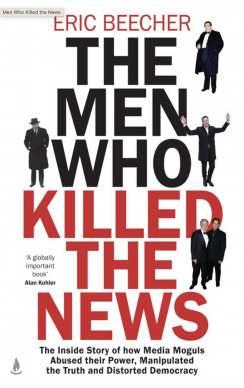Graham Reid | | 2 min read

Anyone who watched the Succession series, is following the real-life replay as media mogul Rupert Murdoch goes to war against some of his children or found on a streaming service Faking Hitler (about the fraudulent “Hitler diaries”), will find this book a compelling account of the venal, manipulative and self-interested men who have controlled and corrupted the traditional media – notably newspapers – for a century.
These men's sole interest is money and to that end they've reshaped what people think of as “news”, bought favours, undermined journalists and the profession of journalism, told lie after lie, evaded taxes, tapped phones, shifted and hidden capital, and – in the absence of a story – have created one.
William Randolph Hearst's notorious comment to a photographer who couldn't find any fighting in the Spanish-American war -- “You furnish the pictures and I'll furnish the war” – seems tame in comparison with the increasing sophistication and gall of the moguls of the past four decades.
This revealing, if somewhat depressing, book isn't without black humour and irony however, not the least when the author – a former editor of the Sydney Morning Herald “lured away” by Rupert Murdoch to his new acquisition, Melbourne's Herald – opens with a legal skirmish with Lachlan Murdoch in 2022 which is almost farcical. If it didn't involve some the highest paid lawyers in the News Corp/Fox Corp stable.
The book is absolutely up to date – published this year – but Beecher goes through the history of how these media moguls – from Hearst and Lord Beaverbrook through Joseph Pulitzer and Henry Luce (Time, Newsweek, one of the decent guys) to Roger Ailes, Robert Maxwell, Murdoch and now that new player in the field Elon Musk.
He notes how Fox in recent years adopt the persistent tone of indignation about what “they” are doing to “you”.
Papers rise and fall in these pages, so do a few of the villains, but Beecher notes a recurring pattern: those on the rise are usually underestimated by their rivals, they make acquisitions (many times paying over the odds), usually promise no editorial interference, are bullish in the marketplace and inevitably start tinkering and meddling for the sake of profit and personal grievance. And hubris.
Sometimes – as seems to be the case with Musk – the mogul is actually the story.
The result?
As Beecher writes, “The news media today is like a once-prosperous man about town who now tramps the same streets, shabbily dressed, looking for handouts. It has lost its advertising rivers of gold . . . the media has never been less trusted or respected. Thirty-eight percent of Americans say they have no confidence 'at all' in the media.”
We live in the world of AI generated lies and images, manipulation of truth, speculation and rumour going viral, a news cycle which gets faster and faster so there is no follow-up story, correction or back-story.
In Beecher's examples there are jaw-dropping accounts of the most vile and reprehensible behaviour by media owners and their minions, and sometimes a heroic figure or organisation with integrity appears. Briefly.
But right now the reputable media itself has to face the uncomfortable truth: “If the people who do democracy's heavy lifting can't convince a wider public why their journalism is essential to a socially functional society, they will continue to lose audiences, credibility and viability.
“News publishers need to both explain and assert their importance, to boldly demonstrate their commitment to ethical journalism and professional conduct in a manner that is non-partisan, non-ideological, non-arrogant and believable.
“Without a rescue mission, news will become more of a specialist niche, like vintage cars, vinyl records and antiquarian books . . .”
So is there any good news to be had after this depressing but necessary and insightful read?
Yes perhaps.
Vinyl records made a comeback so . . .
.
THE MEN WHO KILLED THE NEWS by ERIC BEECHER Scribner $40





post a comment